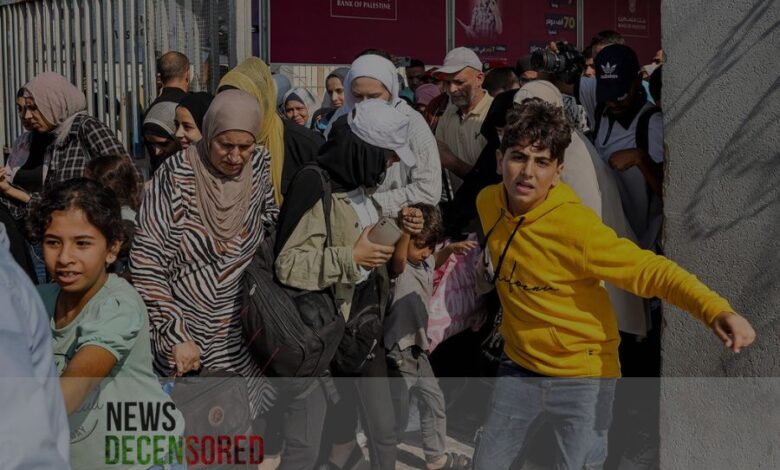Palestinians stranded in Gaza after paying Egypt $5,000 each to escape

The Rafah crossing between Egypt and Gaza has been closed indefinitely since the Israeli army took over the crossing on May 7. This closure has left thousands of Palestinians in limbo. Since the beginning of the Israeli war on Gaza in October and the subsequent closure of all other crossings, the Rafah crossing with Egypt has become the only corridor for civilians fleeing the conflict.
An Egyptian company with exclusive control over exits and transfers through the station was charging Palestinians a fee of at least $5,000 per adult and $2,500 per child to cross to the Egyptian side.
In April, Hala Consulting and Tourism Services, a company owned by Sinai tribal leader and businessman Ibrahim al-Orjani, revealed that it receives at least $2 million a day from Palestinians, reported.
Those scheduled to travel in May after paying thousands of dollars in advance have yet to determine a straightforward way to get their money back.
They are still determining whether they will leave Gaza via Egypt, as Cairo has refused to work with Israel to operate the crossing. Samer, 29 years old, paid Hala $20,000 before Israel closed the Rafah crossing. He wanted to leave Gaza with his new wife and his elderly and sick parents. He had to borrow from friends and family to raise money and sell his car and all his electronic goods.
I feel like a rat in a box running around trying to find a way out, and as soon as I see a hole in the box, someone closes it. I can’t believe that once I got the money, and I was supposed to travel three days after the invasion, I’m still here,” he said. People are unsure when to get their money back or how to contact Hala for assistance.
Hala has not yet provided a clear communication channel or timeline for resolving these issues and does not respond to emails or social media messages. An Egyptian company earns two million dollars a day from Palestinians fleeing the Israeli war on Gaza.
The company did not issue any official statement or comment explaining to thousands of Palestinian customers what they needed to do to recover their money or keep their names registered.
An employee at Hala, who requested to remain anonymous: We have been inundated with calls and complaints. The company is trying to find a solution, but we do not have any specific answers.
Hala’s official Facebook page is filled with messages from Palestinians asking how they can get their money back and wondering what will happen if the borders remain closed.
Others asked anyone who could get a response from Hala to share the information, as all their attempts to contact the office failed.
It is believed that thousands of Palestinians are in the same situation. The daily lists published by Hala in April showed that between 300-400 Palestinians leave through the Rafah crossing daily. Applicants register and pay for these lists weeks in advance.
Tough choices:
Sahar, 36, has a close relative in Egypt who registered her for travel at the Hala office in Cairo. Sahar was supposed to leave Gaza on the same day that Israel invaded the crossing.
When her sister went to the Hala office, she was told they could get a refund, but she would have to wait a while to receive it.
Israel’s seizure of the Rafah crossing with Egypt threatens 45 years of peace. However, when the Rafah crossing reopens, Sahar will have to go through the registration process again, and the company will not guarantee her exit then. I decided not to get my money back. If the crossing reopens, I will have a way out. I said my goodbyes the night before the invasion.
We shouldn’t have to pay money to leave to begin with. Now, even when we can get the money, we must stay. Youssef, 39, paid $13,000 to Hala before the Israeli operation so that she could travel with his wife and two children.
Joseph’s wife sold all her gold jewellery to pay for travel. She always thought she would sell the gold to use it as a down payment on a house in Gaza City. I am torn between two difficult choices. We either have to ask for a refund, which takes a long time to get, or we can wait for the border to open again. This means that if the borders open again, we will lose our ‘turn’ and have to get into the queue again.




